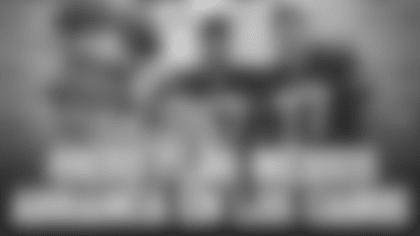Before the 49ers move on from Candlestick Park, their home since 1971, to Levi's® Stadium in Santa Clara, in 2014, the time is right to trek back. Joe Montana leading an epic comeback against the New Orleans Saints in the winter of 1980 lands at No. 6 on Candlestick Park's Top 10 Greatest Moments, presented by SAP.
Each ensuing highlight, which fans voted on from a list of 25 nominations, will be memorialized at a home game in 2013. This continues on Sunday night, when the 49ers host the Houston Texans. The piece of history will also be pictured on each game ticket for the final season at The 'Stick.
It's time to celebrate No. 6.
Five years before Jerry Rice became a 49ers player, the Joe Montana he came to know – and collaborate with so well – was already, well, Joe Montana.
On Dec. 7, 1980, Montana led San Francisco from being 28 points down to beat the New Orleans Saints, 38-35, in overtime.
"We always called him 'Joe Cool' because you never saw him get rattled," Rice told 49ers Studios recently. "He was always composed on the football field. You know that if we had some time on the clock and he was behind center we could move that ball all the way down the field and win that football game."
That was the case on this winter day a quarter-century ago at Candlestick Park. The best comeback in NFL history to that point – and one of the great games in The 'Stick's past – would not have been possible if not for No. 16.
But it wasn't easy on a dreary, 48-degree day.
"It was one of those days where the field was a mess to begin with, which it typically was during those early years," Montana told 49ers Studios. "Dwight called it, 'The quagmire.'"
Whatever the case, the 49ers offense couldn't get going early while the Archie Manning-led Saints offense could do no wrong.
Aside from wide receiver Freddie Solomon's 57-yard punt return touchdown in the second quarter, San Francisco went scoreless into halftime.
"Bill got to the point where things were just not going our way offensively or defensively and called us up and said, 'Look guys, it's not our day today. We're going to start over from right now and let's try to build something going forward to the end of the game and let's get going something positive to get us into next week,'" Montana recalled of then-coach and Hall of Famer Bill Walsh. "He didn't do anything crazy, he didn't just (say), 'Throw it down the field and try to hope for plays.'
"We went back into our base-offense. And we found out that our offense, the base-side of our offense, was pretty good and allowed us actually to come back and win that game."
Pretty good is an understatement.
Montana's one-yard rushing touchdown in the third quarter was the first of four straight San Francisco touchdowns. Kicker Ray Wersching's 36-yard field goal in overtime broke the 35-35 tie.
Montana would finish 24-of-36 passing for 285 yards and two touchdown tosses, including one 71-yard scoring strike to Clark, whose cleats clearly adjusted to the field.
The stats were pretty because, in addition to keeping his composure, Montana had the smarts to make up for the lack of arm strength. So said Rice.
"Because of the west coast offense – five-step drop ball is gone, three-step drop ball is gone – Joe, he told me this over and over again, that when I came into the league I added five more ears onto his career because he knew that he could drop back three steps and release the football," Rice said. "When you get rid of the ball that fast, you don't have to worry about the defensive line making contact with you or power-driving you into the ground."
It makes sense then that Montana went un-sacked on this particular Sunday at The 'Stick.





